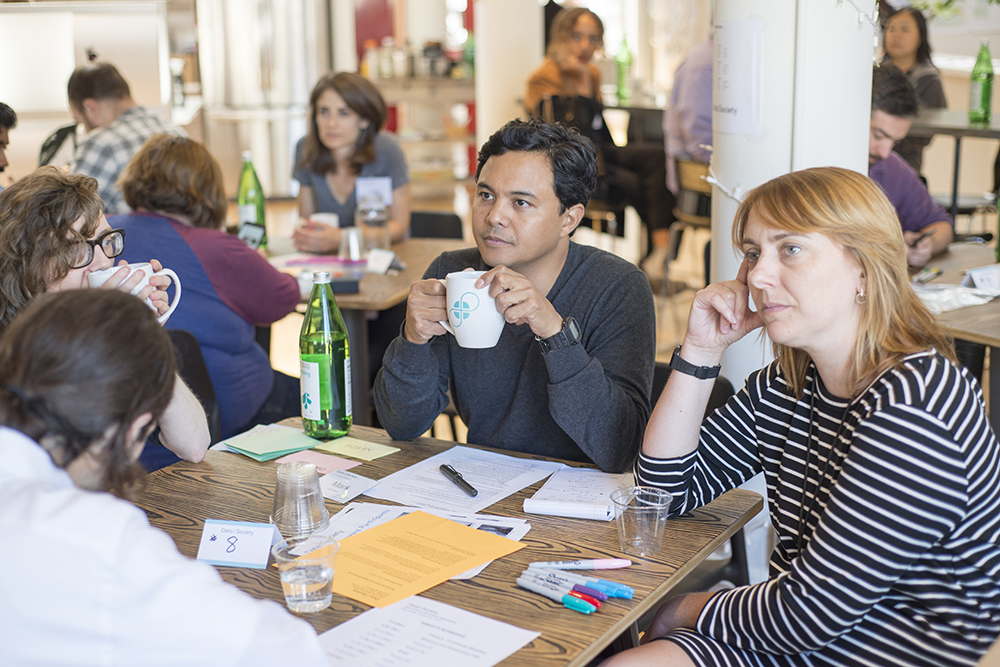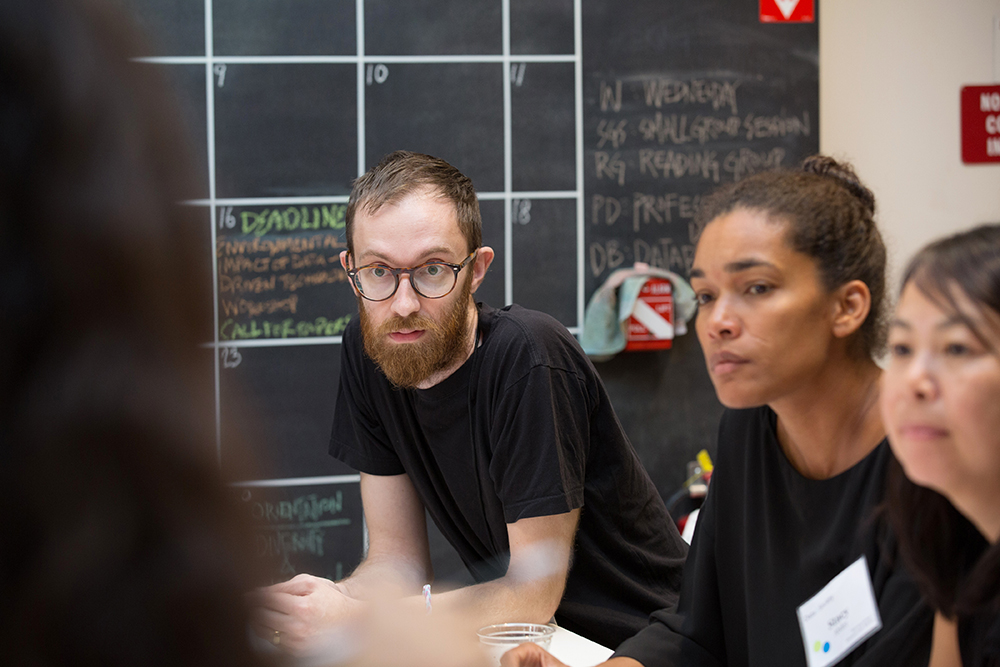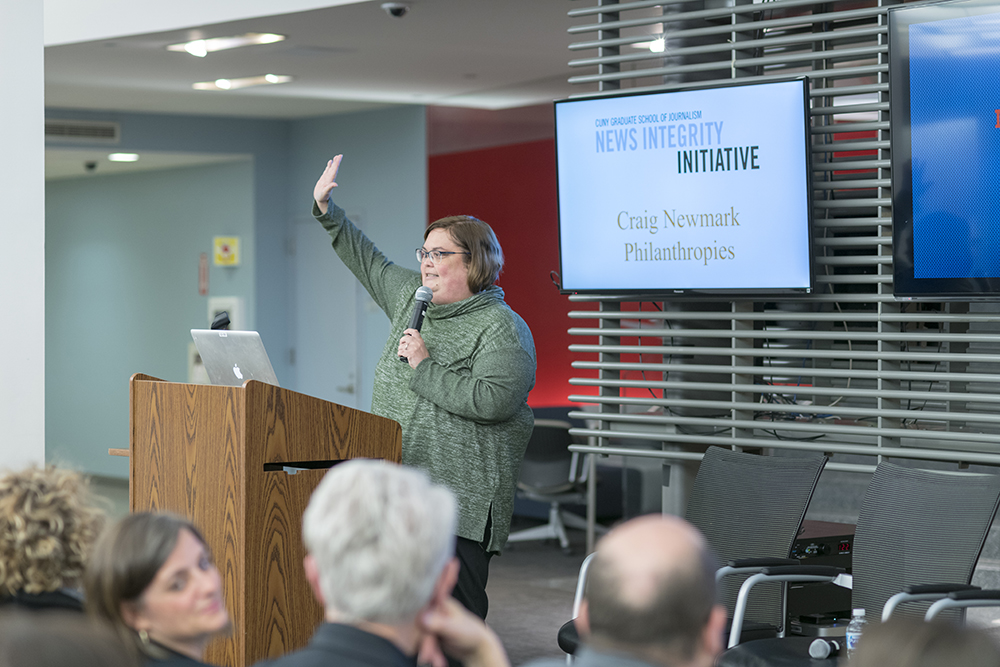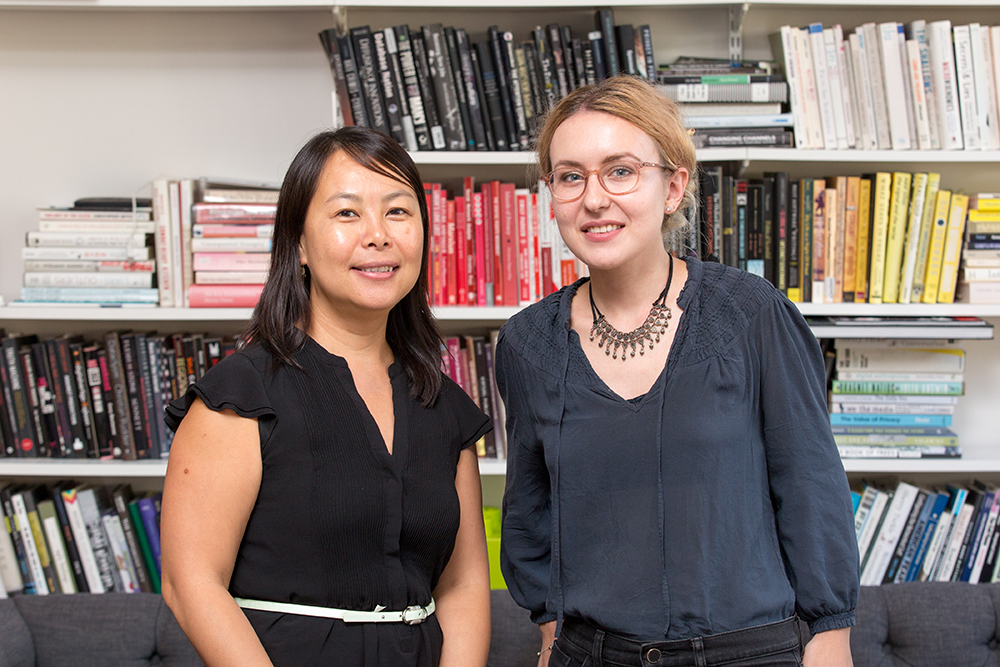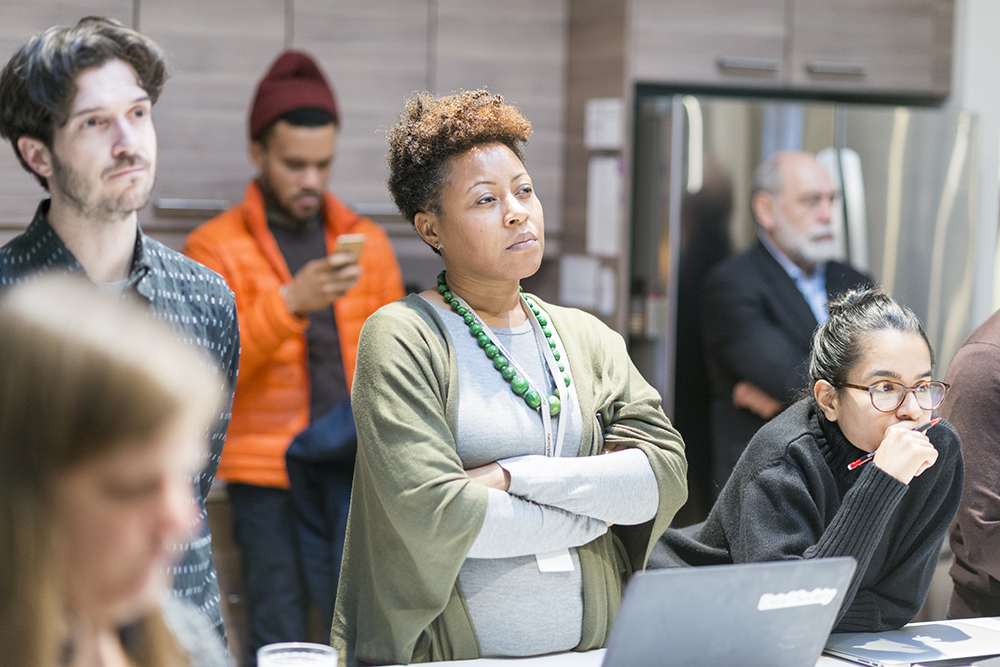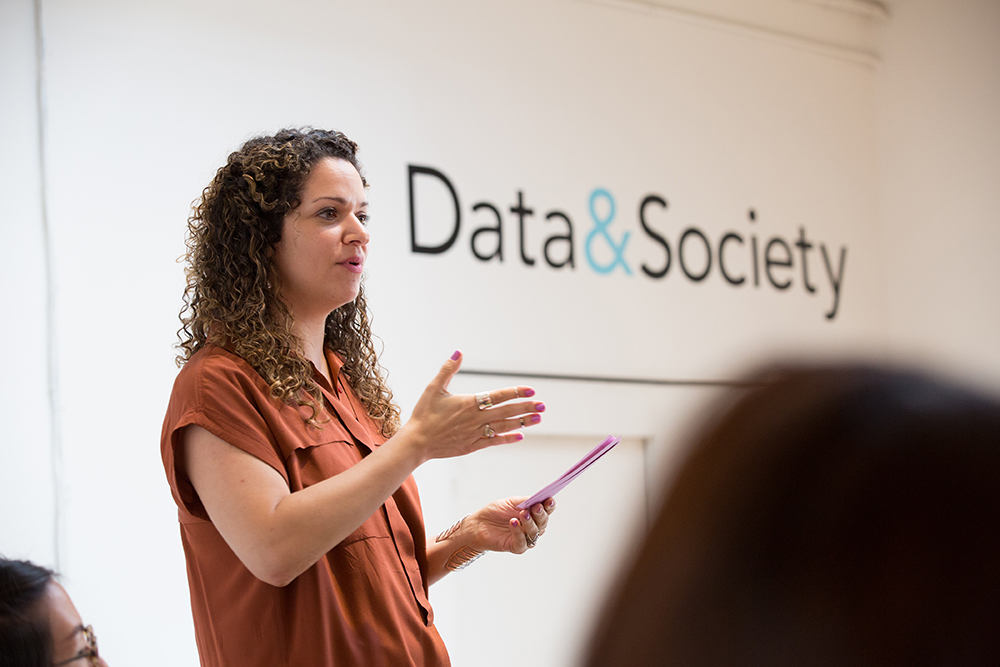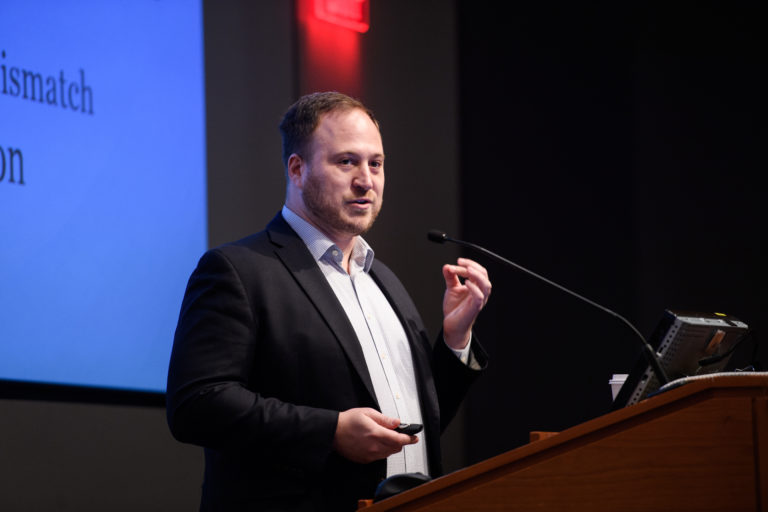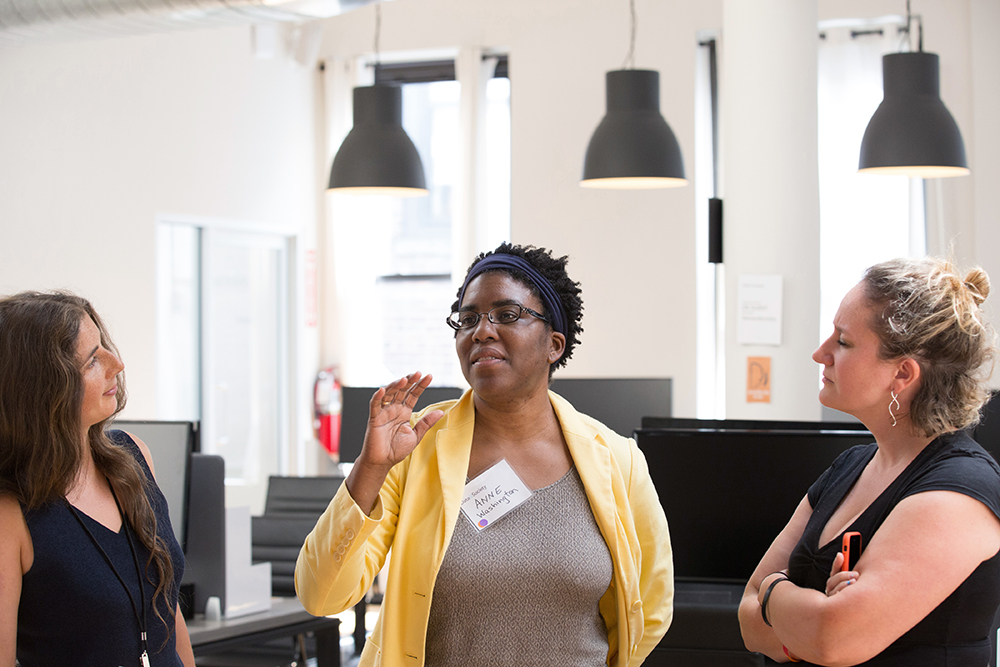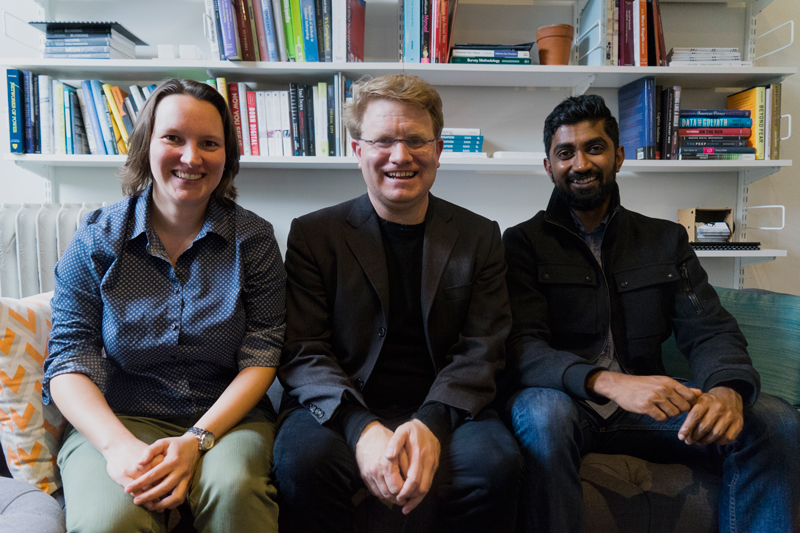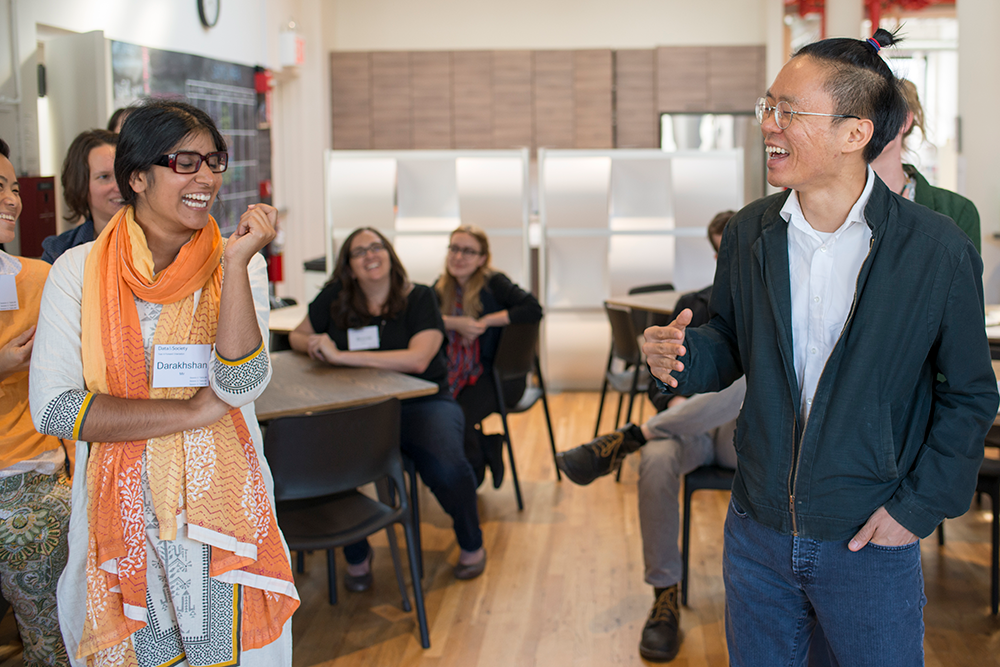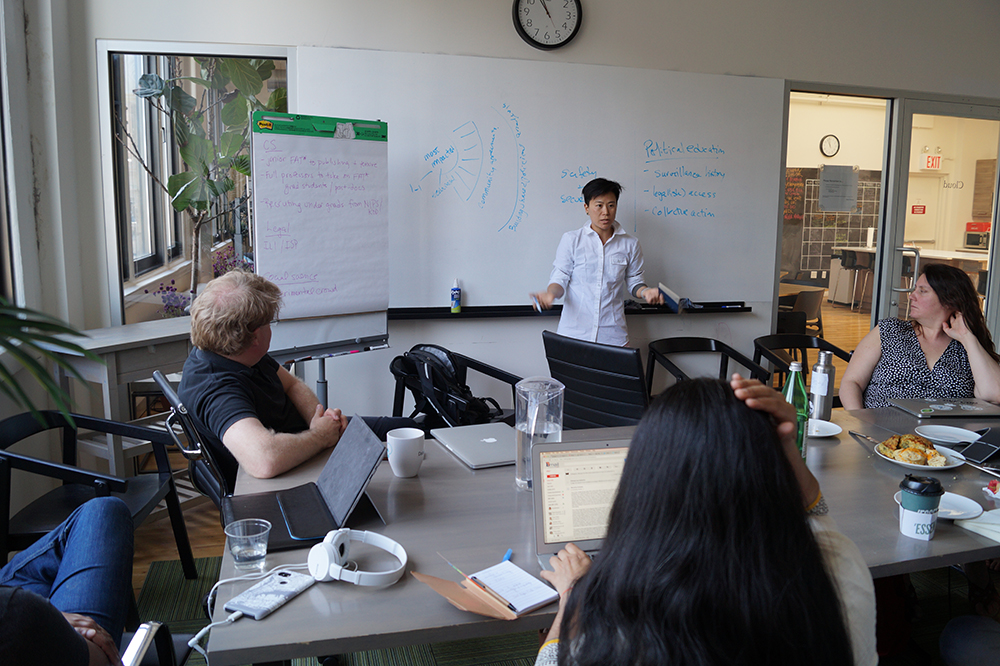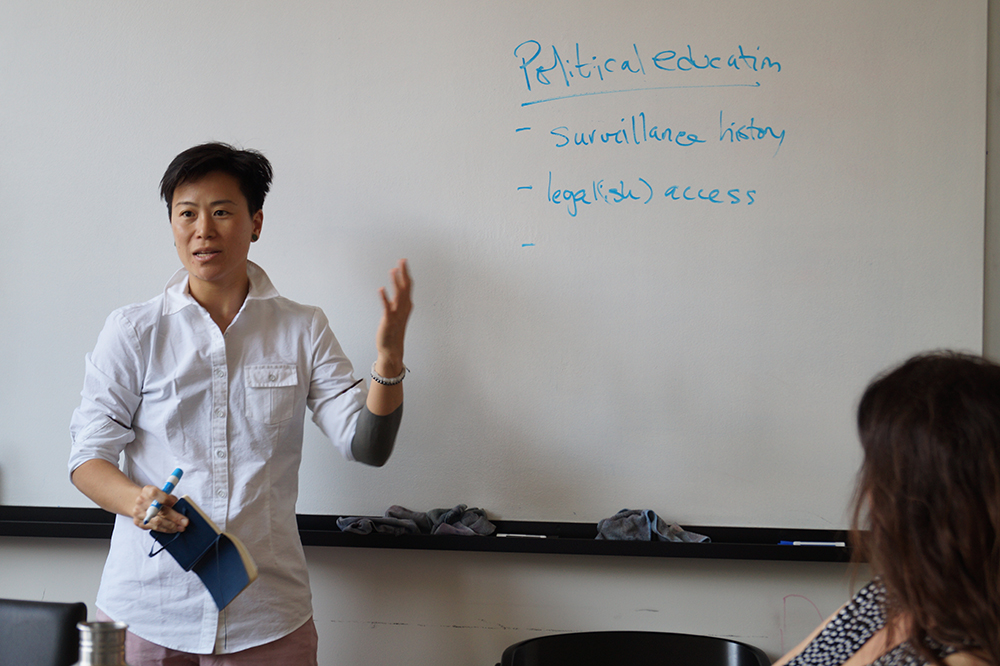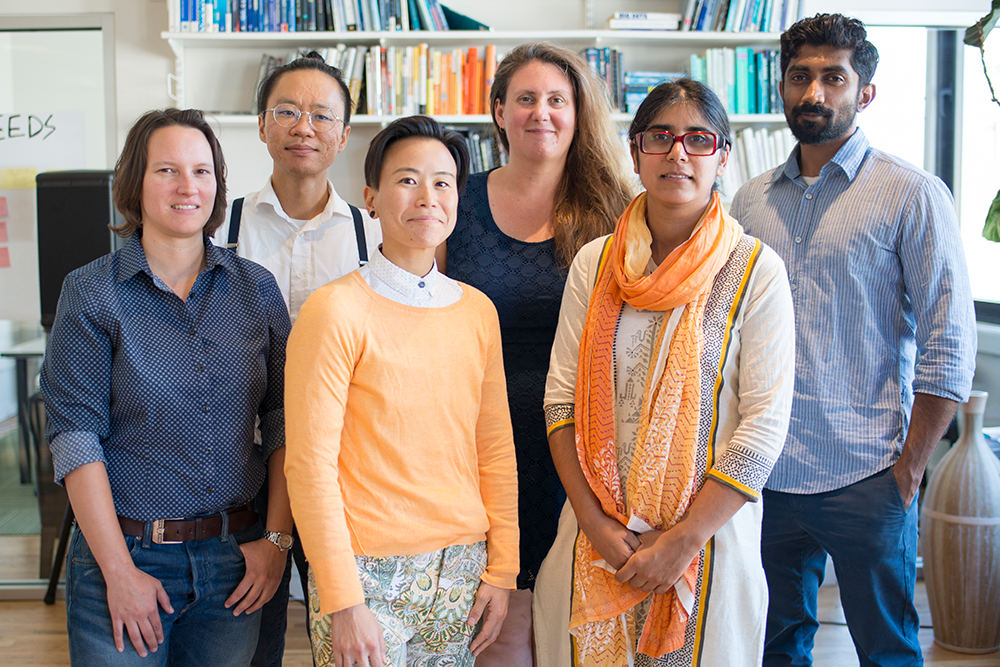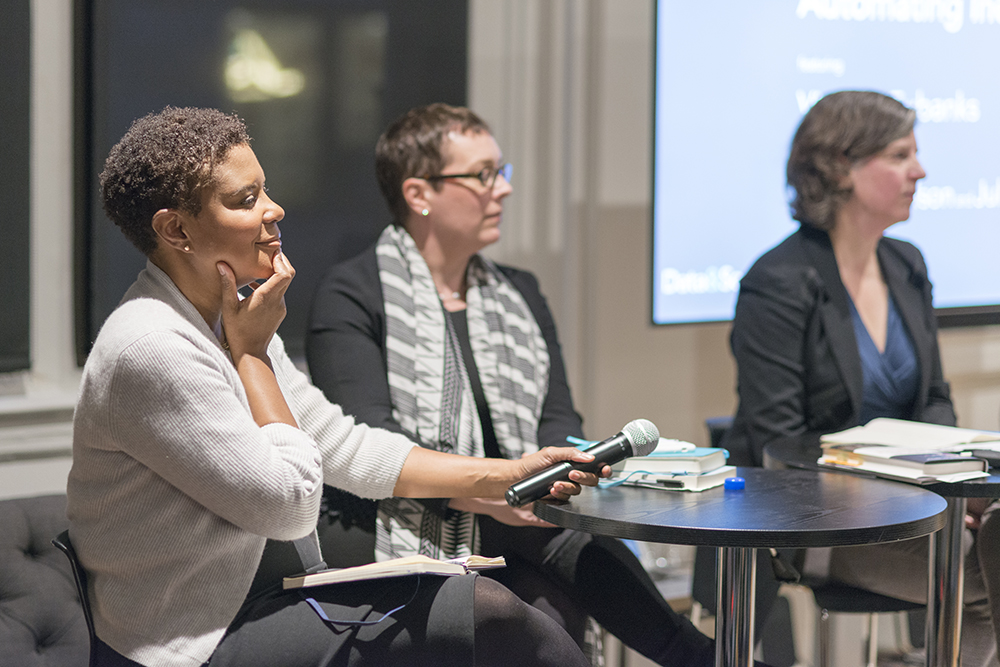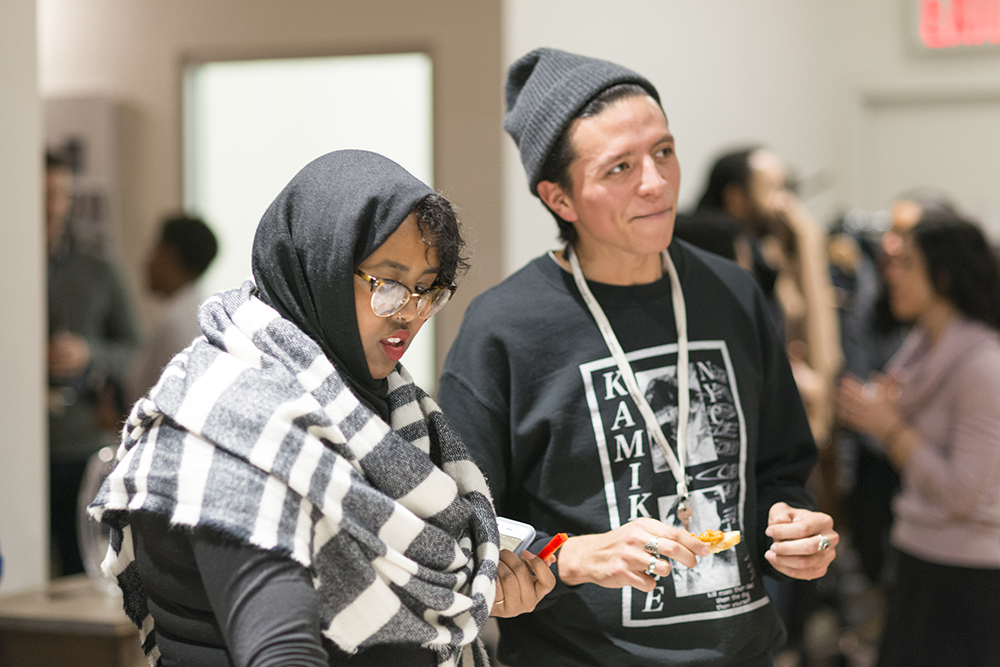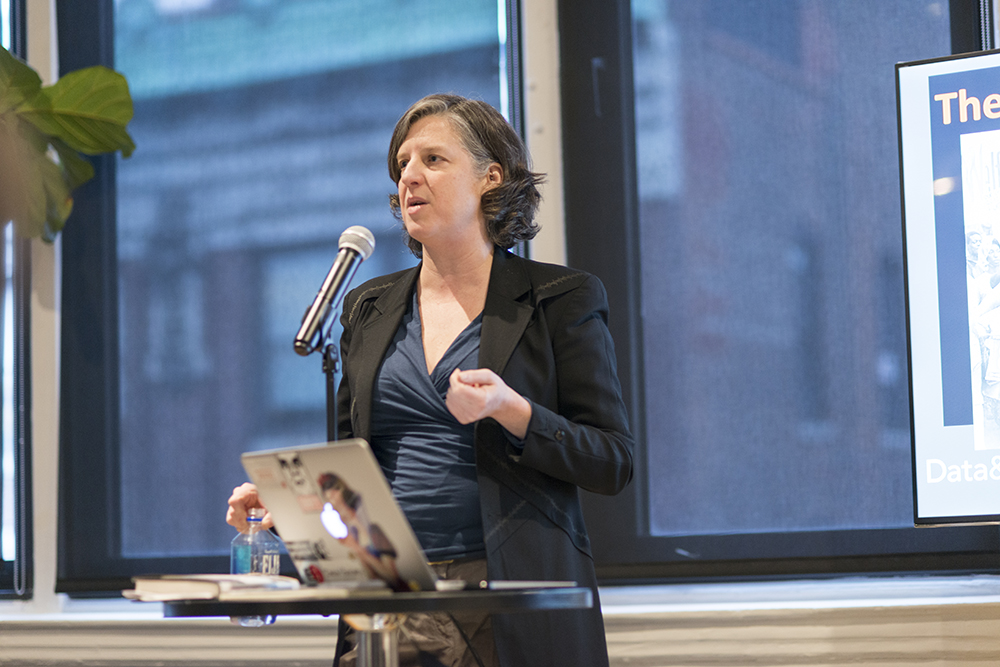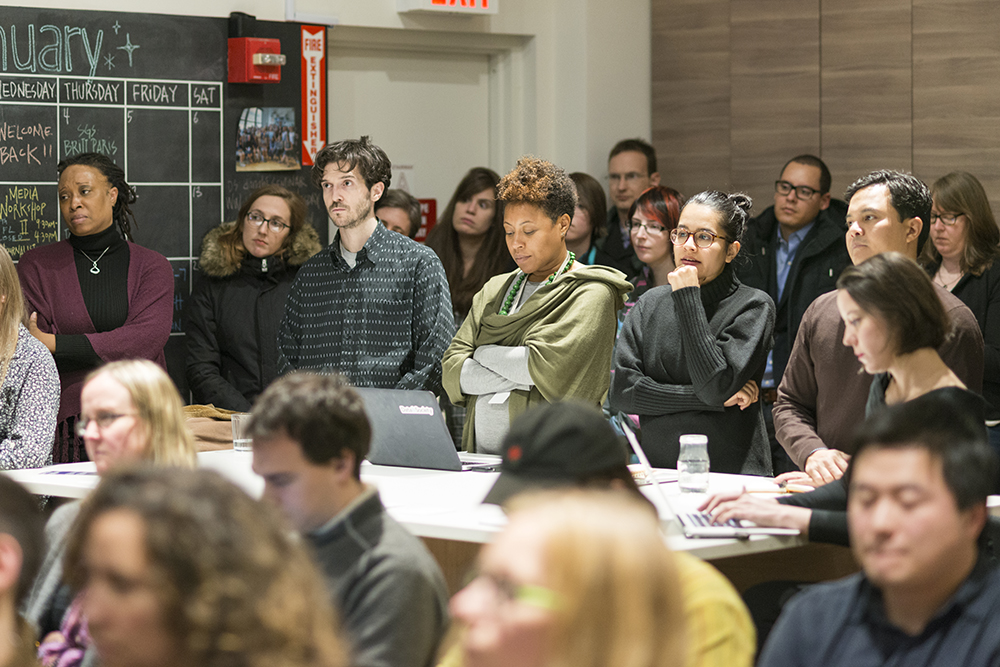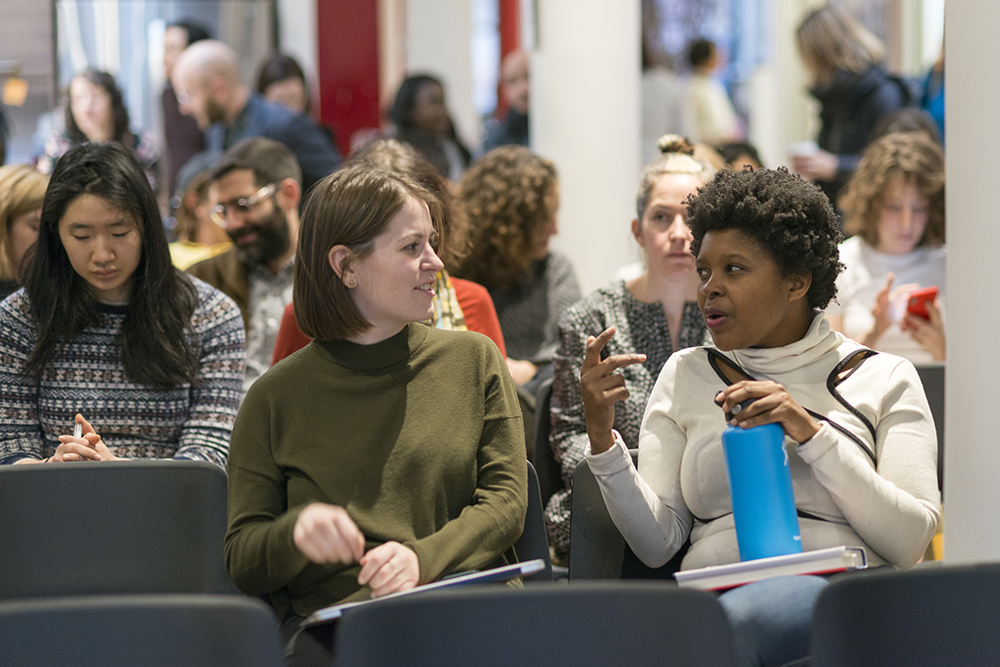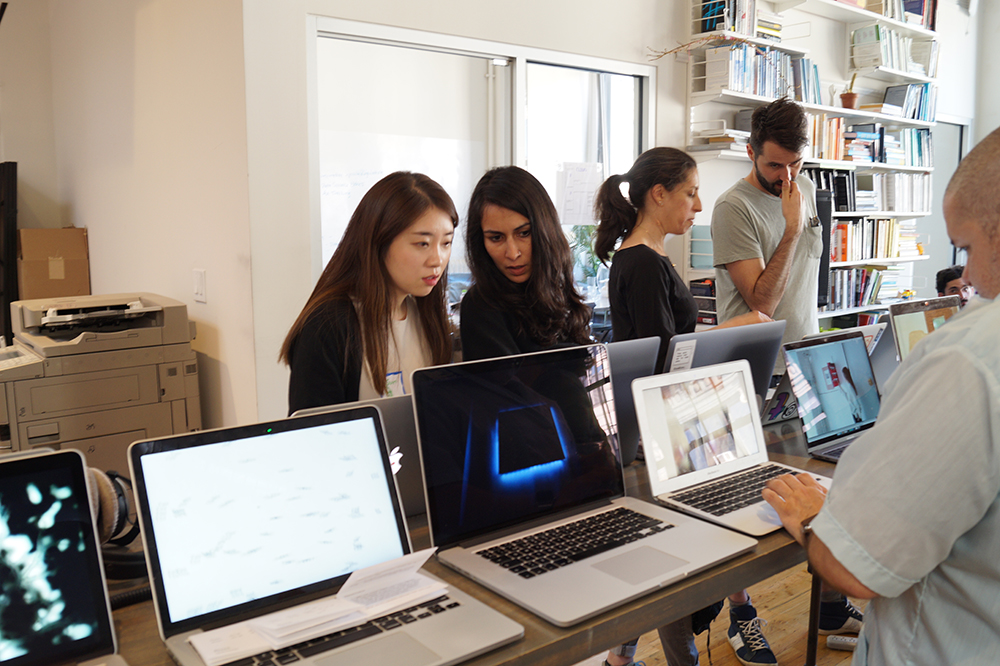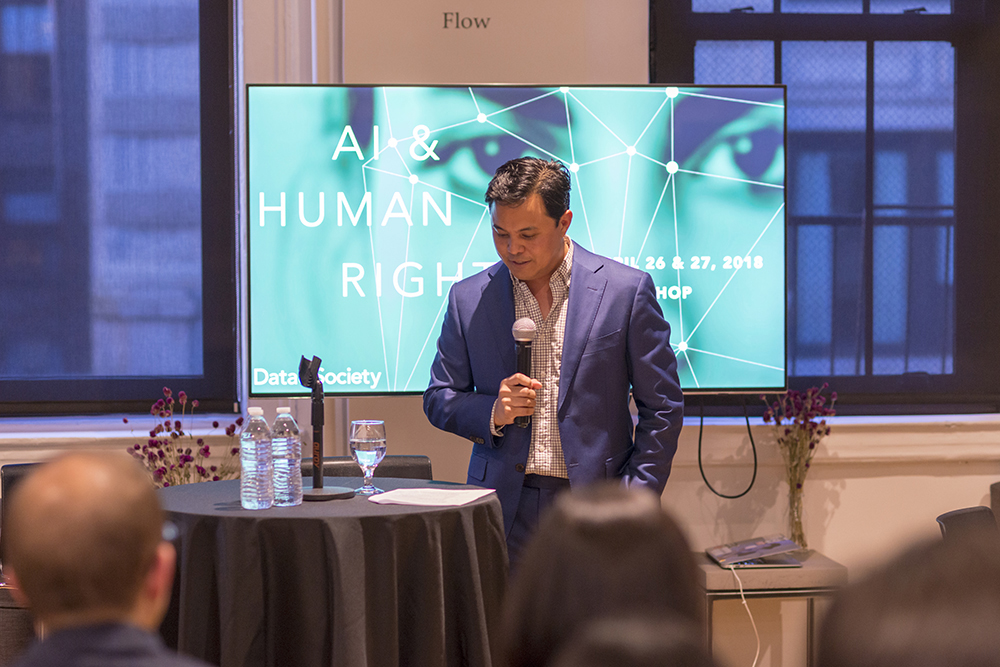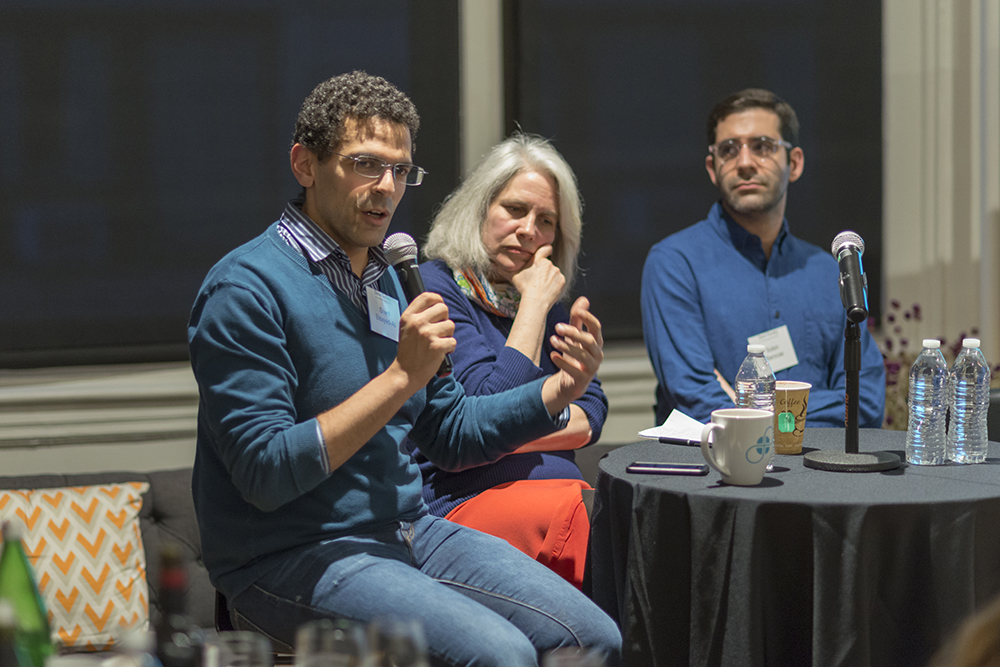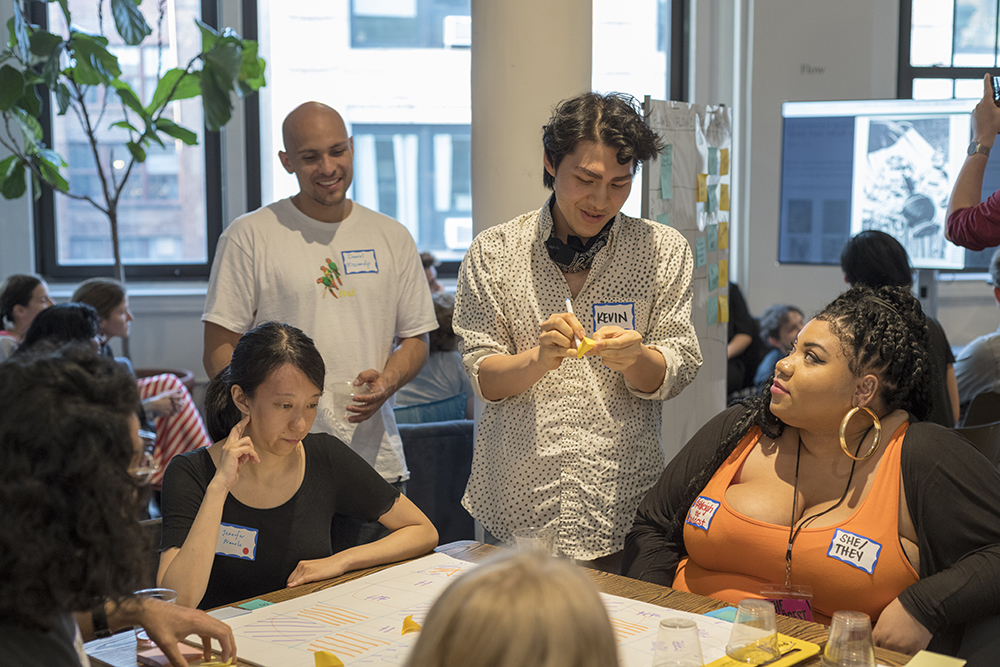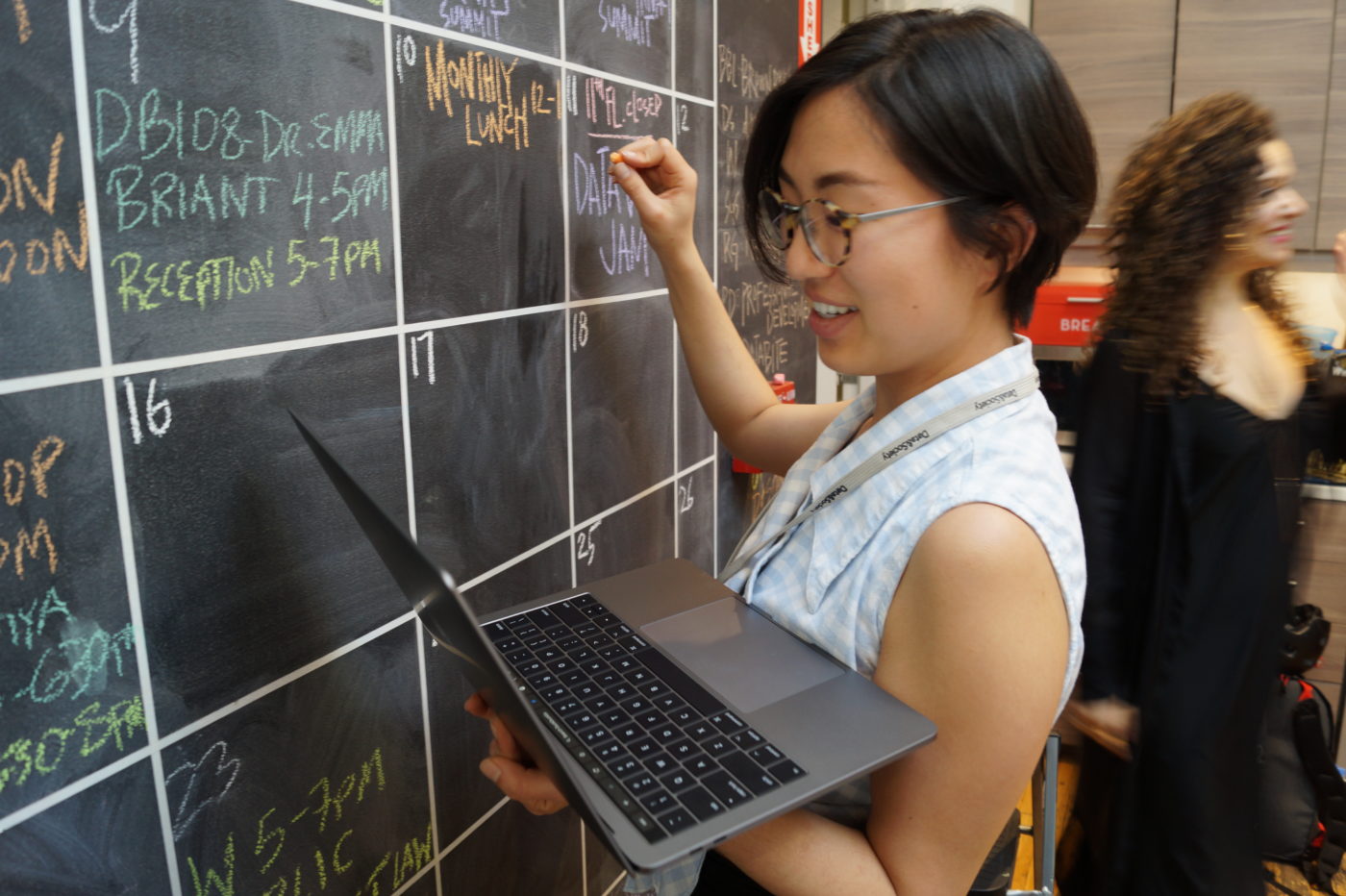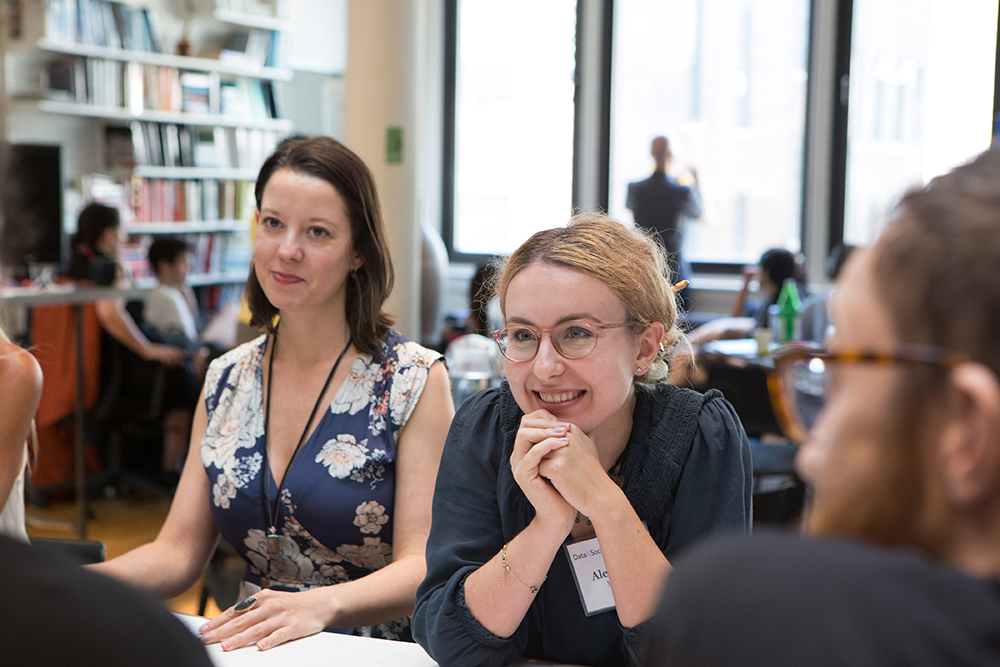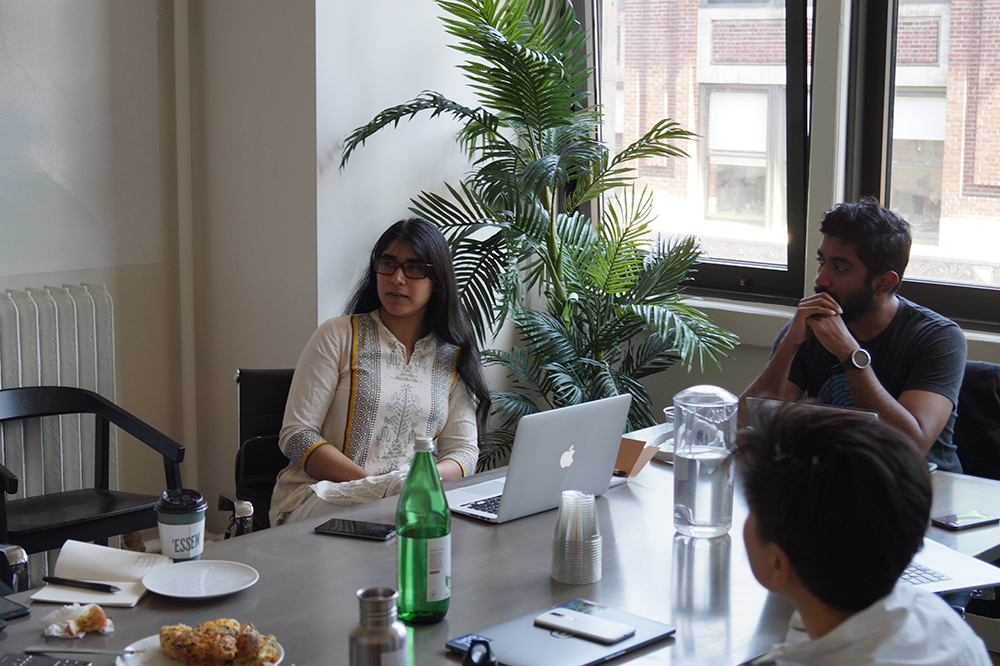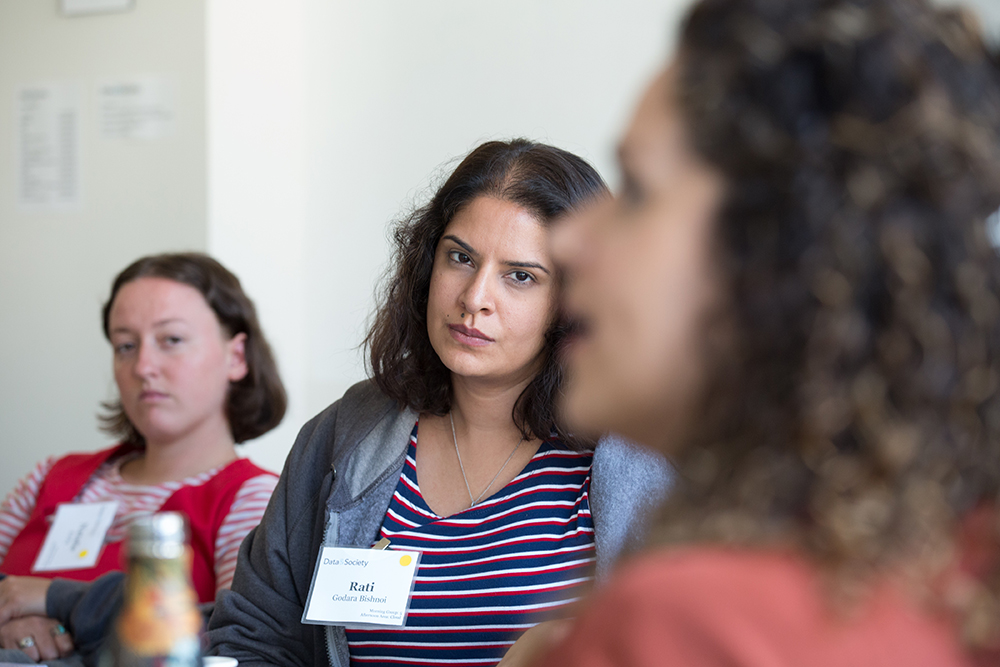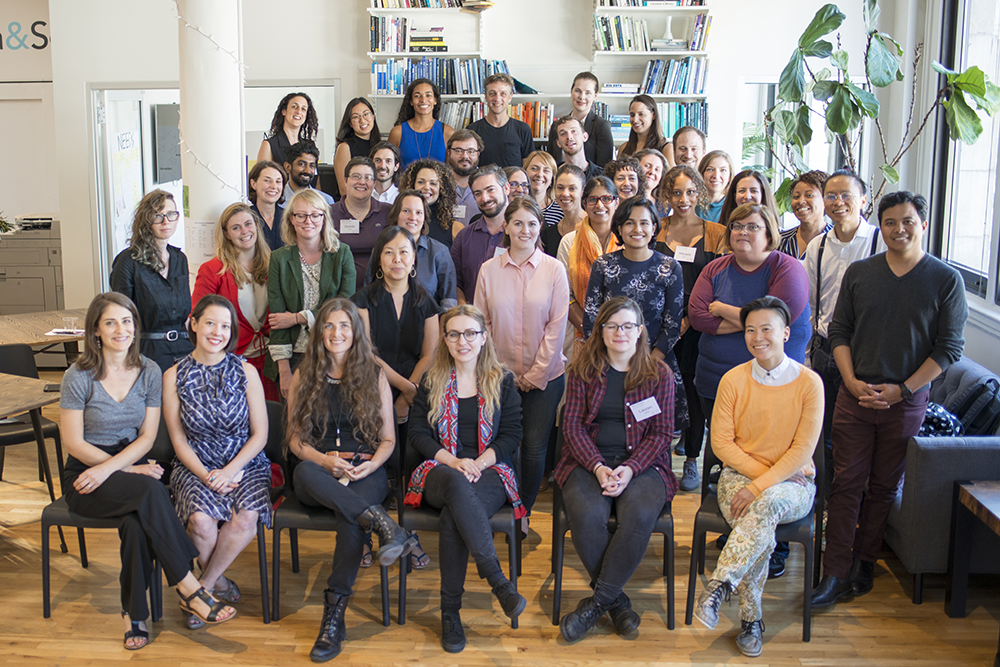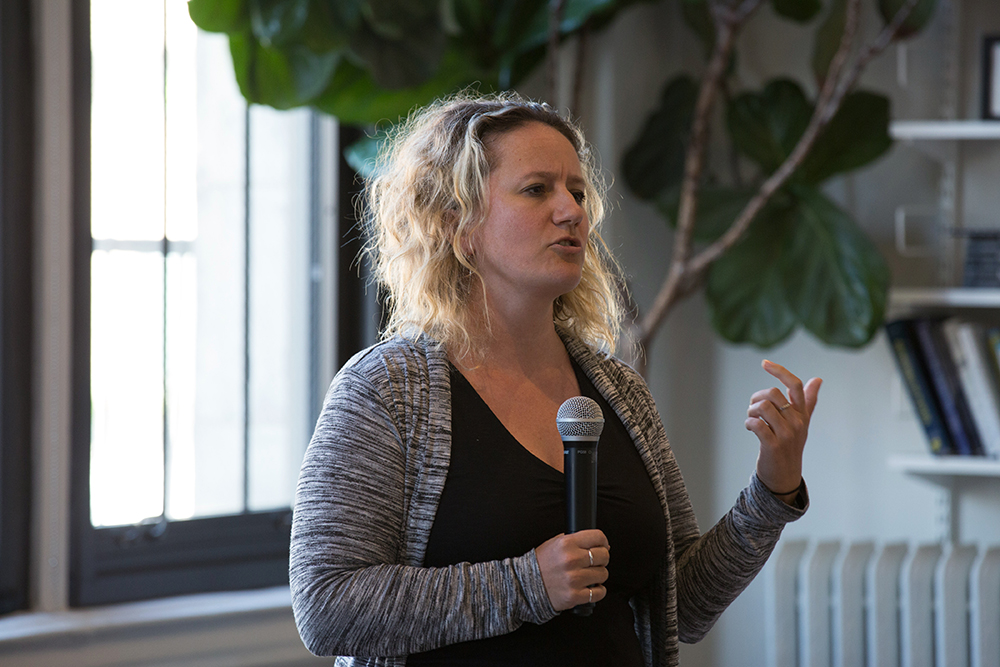Annual Report 2017–2018
In 2017-2018, Data & Society worked to balance our commitment to rigorous empirical research with new engagement efforts to ensure that this knowledge reaches those shaping the development and governance of technology.
This year, we welcomed new Executive Director Janet Haven and began our first strategic planning sprint to calibrate our efforts so that our research insights continue to have both resonance and reach.
As Data & Society moves into its fifth year, we will continue to pursue frame-breaking research questions informed by the realities of those who may be adversely affected by data-centric and automated technologies.
"Our strategy commits us to rigorous research and field-expanding engagement work that asserts the values of fairness, accountability, and justice in a data-centric world."
- To challenge existing narratives about the purpose and power of technology in society using rigorous interdisciplinary research
- To expand and support a diverse field of people and organizations grappling with cultural, legal, political, and technical approaches to issues raised by data-centric technologies
- To ensure that civil society, media, policymakers, and industry engage with our research insights—and those of our broader network—to inform and reframe decision-making around technology
- To encourage a culture and practice of open experimentation and new forms of knowledge production
"Our research helps ground decision-makers as they grapple with complex societal challenges that involve new technologies."
Our work—the combination of rigorous, convention-challenging research and targeted engagement—is having real impact in the world.
Data & Society seeks to provide a supportive network and platform for stakeholders grappling with the consequences of data and automation–whether these be technology companies, civil society organizations, newsrooms, or governments and philanthropic organizations. Recent accomplishments in this effort include:
- Adding legal and sociological arguments to a key privacy Supreme Court case;
- Changing the conversation around automated systems, policing, and evidence;
- Combating disinformation by converting research into action and best practice;
- Uniting partners in rapid response to widespread surveillance of the disadvantaged; and
- Creating shared terminology and outlining emerging risks on timely topics such as precision medicine.
We are profoundly grateful to the network of researchers, staff, fellows, supporters, advisors, and partners who make Data & Society’s approach to impact through evidence and engagement a reality.
From all of us, thank you for your continued support.
We are committed to the independence and autonomy of Data & Society’s initiatives and convenings.
We do not accept funding that would affect our ability to pursue work free of external interference, and we fiercely protect the independence of our researchers and fellows in their intellectual activities and individual funding relationships.
Annual Report 2017–2018
Our researchers aim to produce rigorous, high-quality, and relevant evidence that can meaningfully inform, ground, and frame public debates.
Research at Data & Society falls under three overarching themes:
- Vulnerabilities in socio-technical systems: While calls for greater accountability mechanisms within socio-technical systems are widespread, these systems are increasingly subject to manipulation. These systems are also vulnerable to biased data that infuse algorithmic models. These conditions require an assessment of strategic manipulation, a broad imagination about the possibilities for encoding fairness and accountability into technical systems, and deep ethnographic research that describes and understands new social activity.
How do we understand and combat vulnerabilities in socio-technical systems?
- Systems of rights, equity, and governance in a networked world: Rights and values provide legal and ethical frameworks to guide decision-making; inspire human-centric policy; and hold institutions, nation-states, and powerful individuals to account across jurisdictions. The use of rights and values as a source of governance and design inspiration for automated and data-centric technologies requires both re-examination and, potentially, a challenge to existing assumptions.
Can we use a rights-based framework to guide the development of artificial intelligence?
- Intersections of humans and intelligent systems: Conventional narratives around automated systems often assign power and agency to the machines. But humans remain significant actors—as designers, partners, users, or contraveners—in these systems. The nature and value of their contribution to the system’s function, as well as its real-life outcome, is often elided or invisible.
How do we facilitate ethical design and effective regulation as human labor meets intelligent systems?
This year’s four emerging research tracks were:
- Media Manipulation and Disinformation, which includes the Media Manipulation Initiative, Disinformation Action Lab, and various Platform Accountability projects;
- Social Instabilities in Labor Futures, which includes multiple projects, the upcoming release of the book Uberland, and engagement work with labor stakeholders;
- Health and Data, which includes projects focused on the unintended consequences of health data collection, equitable outcomes, and healthy behavior with tech;
- Social Impacts of AI, which includes interconnected work areas such as Fairness, Accountability, and Transparency in Machine Learning; human infrastructures of AI; and human rights and AI.
"Black-boxed algorithms can unfairly limit opportunities, restrict services, and even produce ‘technological redlining.'"
Algorithmic Accountability: A Primer
The Media Manipulation Initiative takes a sociotechnical approach to understanding the social, political, and economic incentives to game information systems, websites, platforms, and search engines—especially in cases where the attackers intend to destabilize democratic, social, and economic institutions. Media Manipulation uses empirical research to identify the unintended consequences of socio-technical systems and to track and address threats.
This year, the team produced three reports and one paper covering a broad range of themes: SEO and “alternative facts,” content moderation, and the recent “attention hacking” of journalists and editors by coordinated online extremists, antagonists, and manipulators.
The initiative additionally hosted multiple closed-door engagements with field stakeholders to increase organizational capacity across disciplines. Relatedly, the Disinformation Action Lab piloted two ongoing projects, and published a primer on “data voids” in search engine queries.
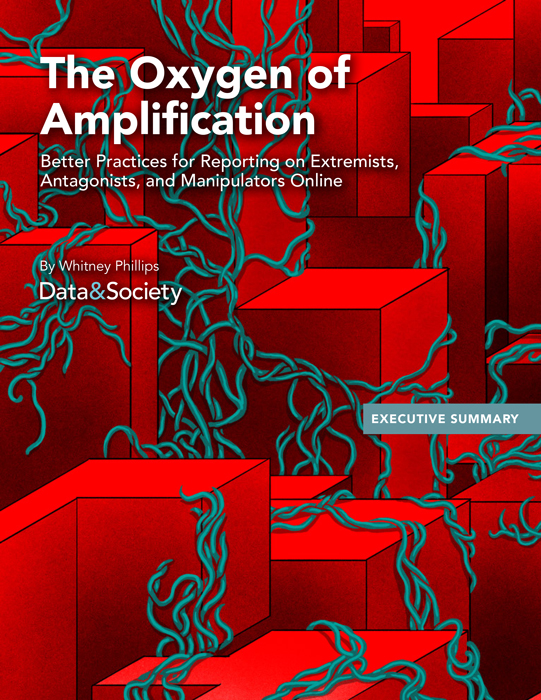
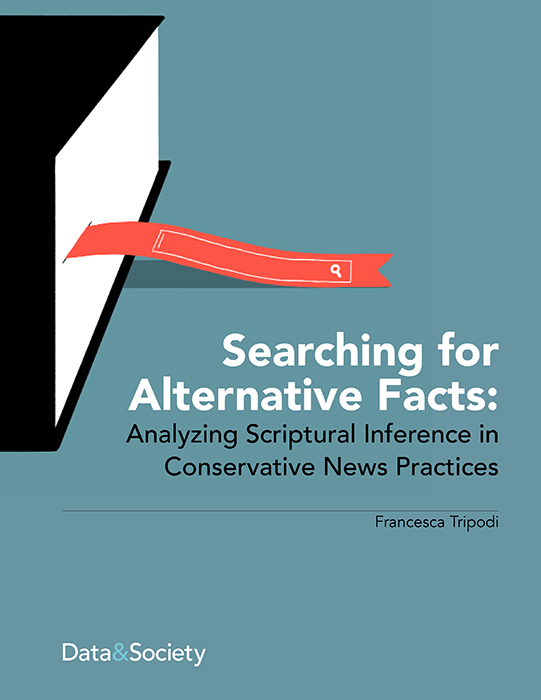
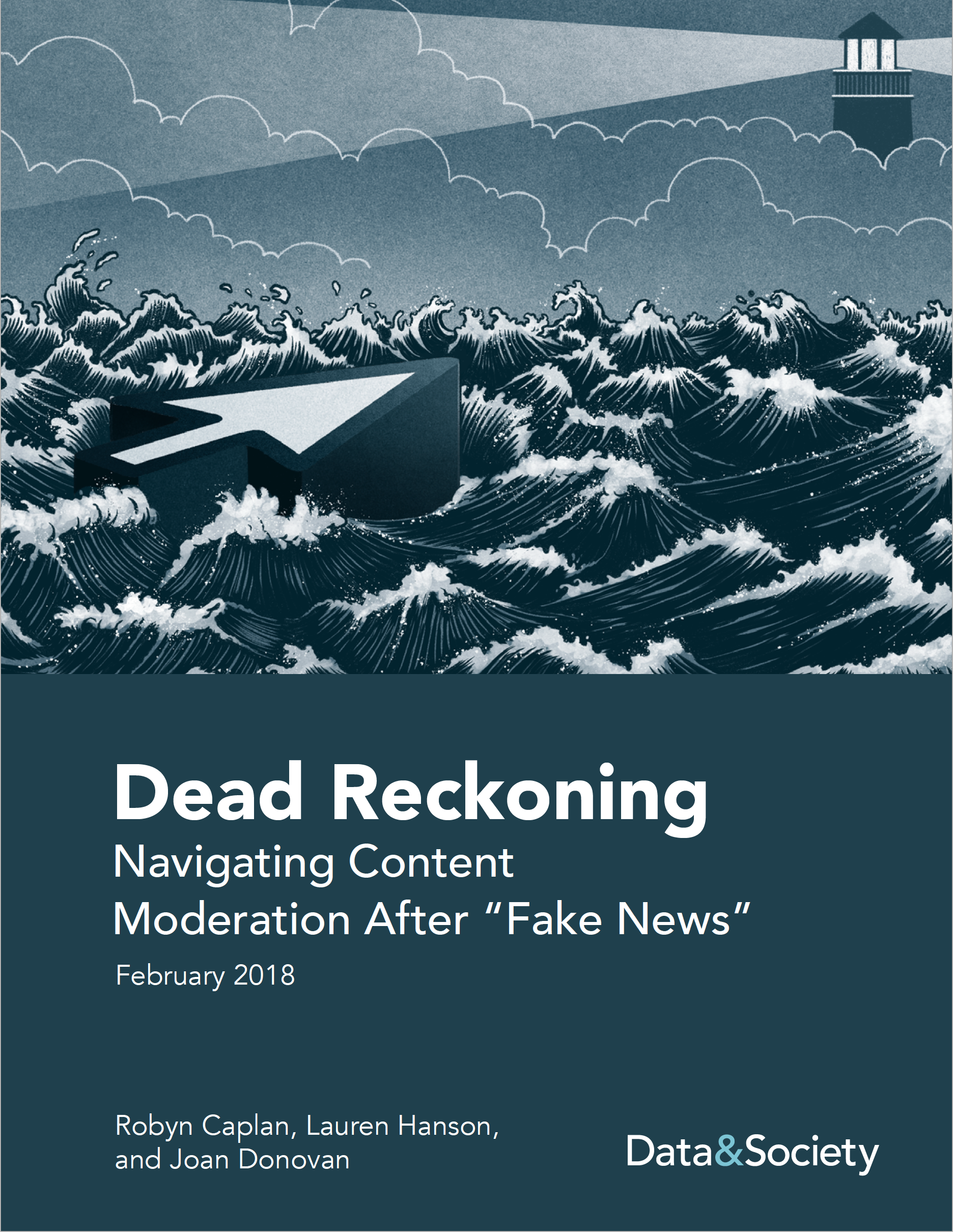
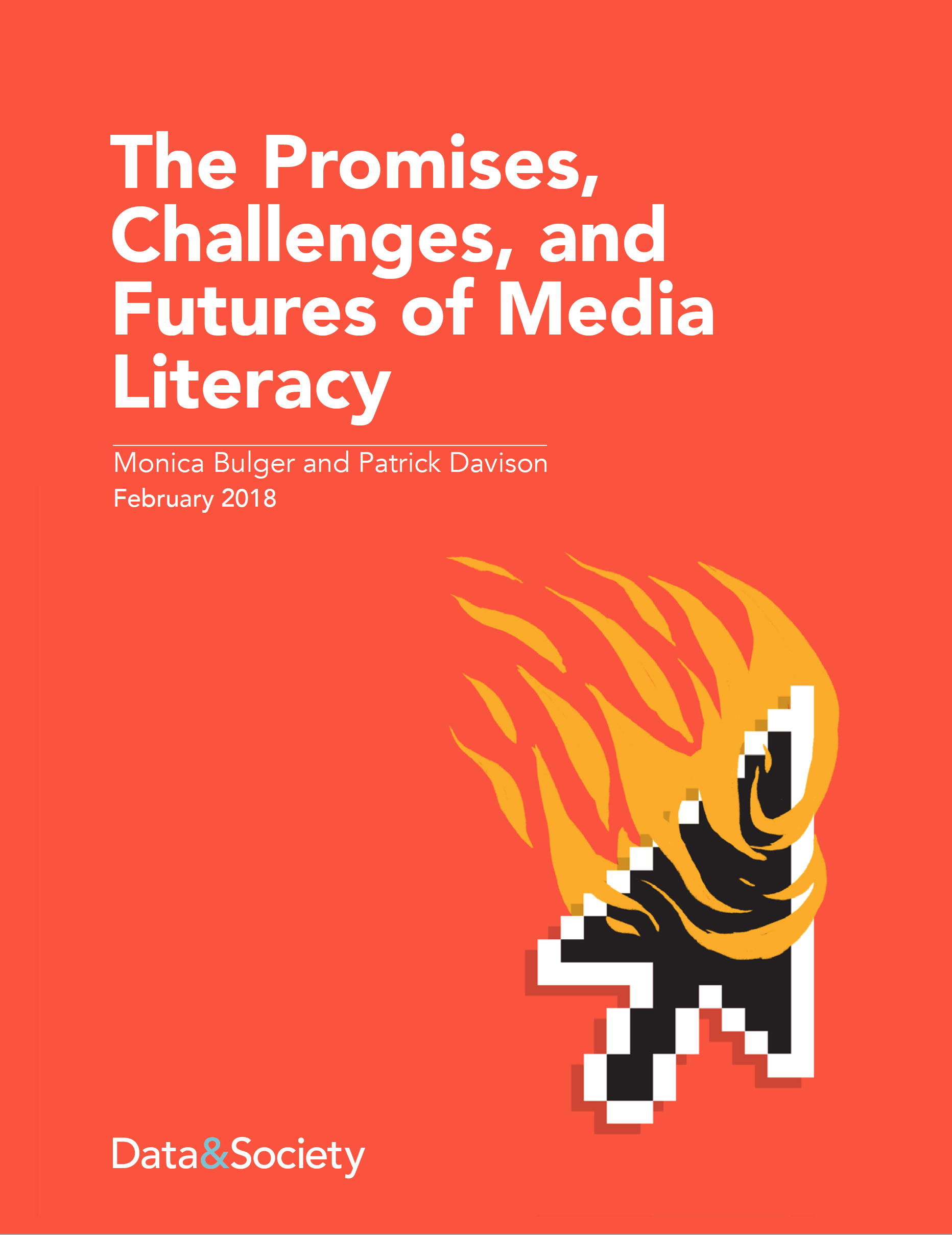
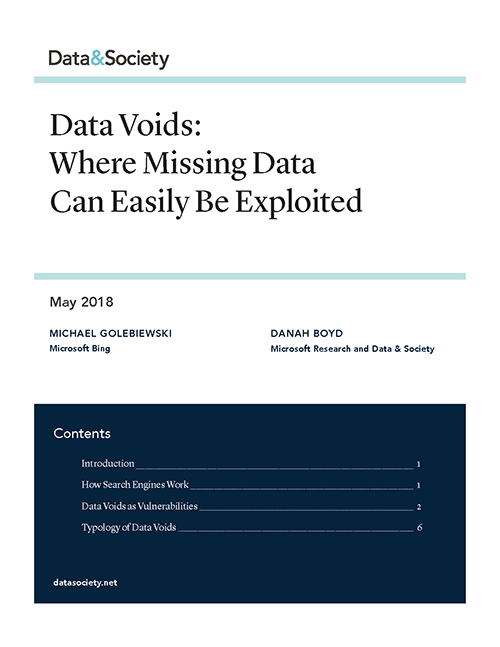
Technology is disrupting, destabilizing, and transforming many aspects of the labor force. The Social Instabilities in Labor Futures initiative seeks to better understand emergent disruptions in the labor force as a result of data-centric technological development, with a special focus on structural inequalities.
This year, the Future of Labor team released Beyond Disruption, an ethnographic report representing interviews with over 100 domestic and ridehailing platform workers in major U.S. cities to reveal how technology is reshaping the future of labor. Insights from the report were featured in researcher op-eds in the New York Times and Slate, and a researcher appearance on NPR All Things Considered.
The report was shared by the New York City Mayor’s Office of Economic Opportunity and reached civil society, policy, and legal leaders through webinars and presentations for groups, such as the Center for Law and Social Policy and the Leadership Conference on Civil and Human Rights’ Civil Rights, Privacy, and Technology Table. Looking ahead, ridehailing researcher Alex Rosenblat will release her forthcoming book Uberland: How Algorithms Are Rewriting the Rules of Work on October 23, 2018.
"It is naive, going forward, to assume that technology can flatten entrenched inequalities through standardization and scale."
Beyond Disruption
Health and Data is a growing focus for Data & Society and includes works on topics such as the unintended consequences of health data collection, equitable outcomes, and healthy behavior with tech. This year, the initiative focused on “precision medicine,” a growing field that aims to use multiple data sources to tailor medical care to individuals. The Fairness in Precision Medicine project aims to critically assess the potential for bias and discrimination in health data collection, sharing, and interpretation.
The Fairness in Precision Medicine team released the first ever report to deeply examine the potential for biased and discriminatory outcomes in this emerging field that “collects, integrates and analyze multiple sources of data in order to develop individualized insights about health and disease.” The report release was accompanied by What Is Precision Medicine?—a general audience white paper to introduce and outline this emerging field—and a detailed Precision Medicine National Actor Map that visualized major players in health data collection.
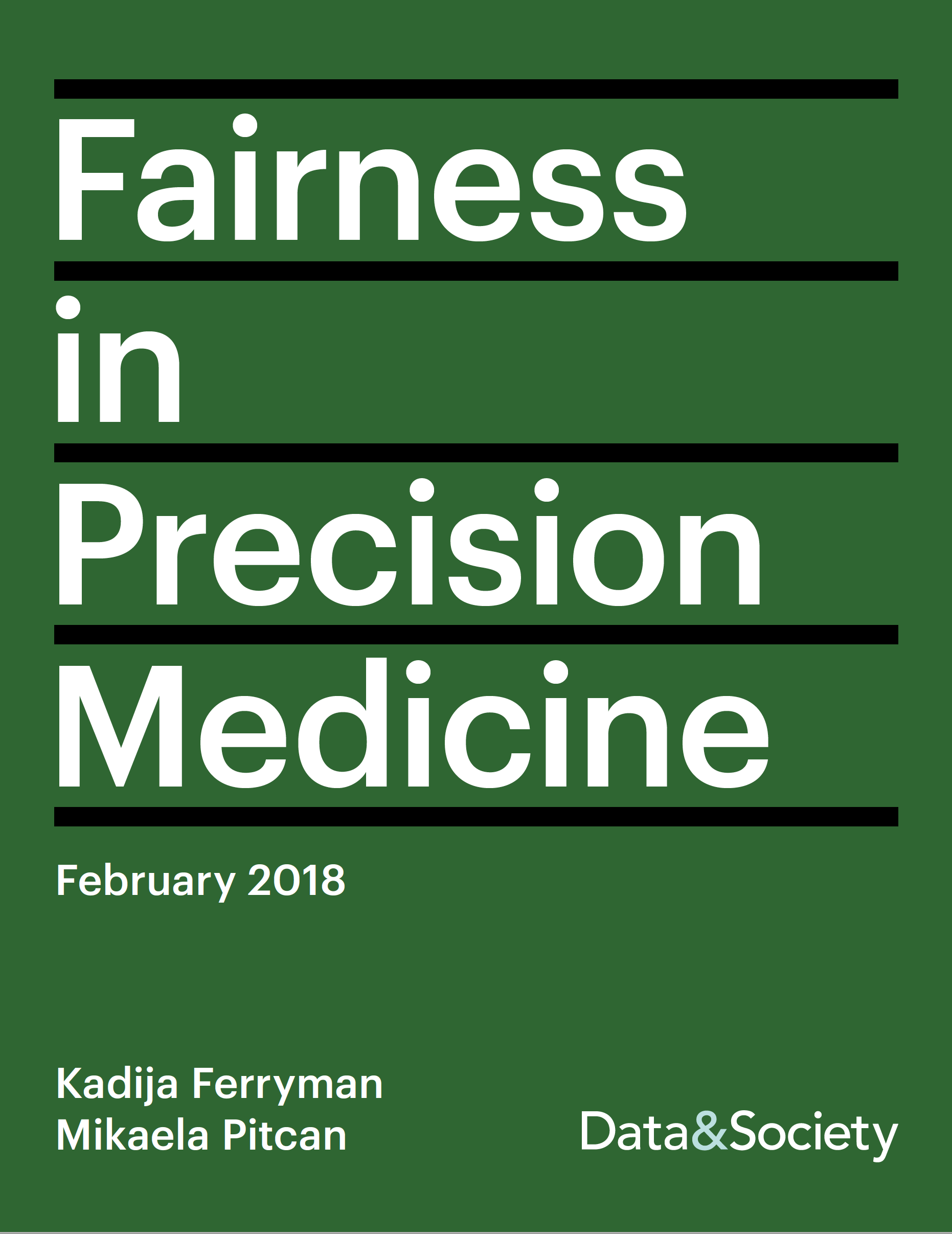
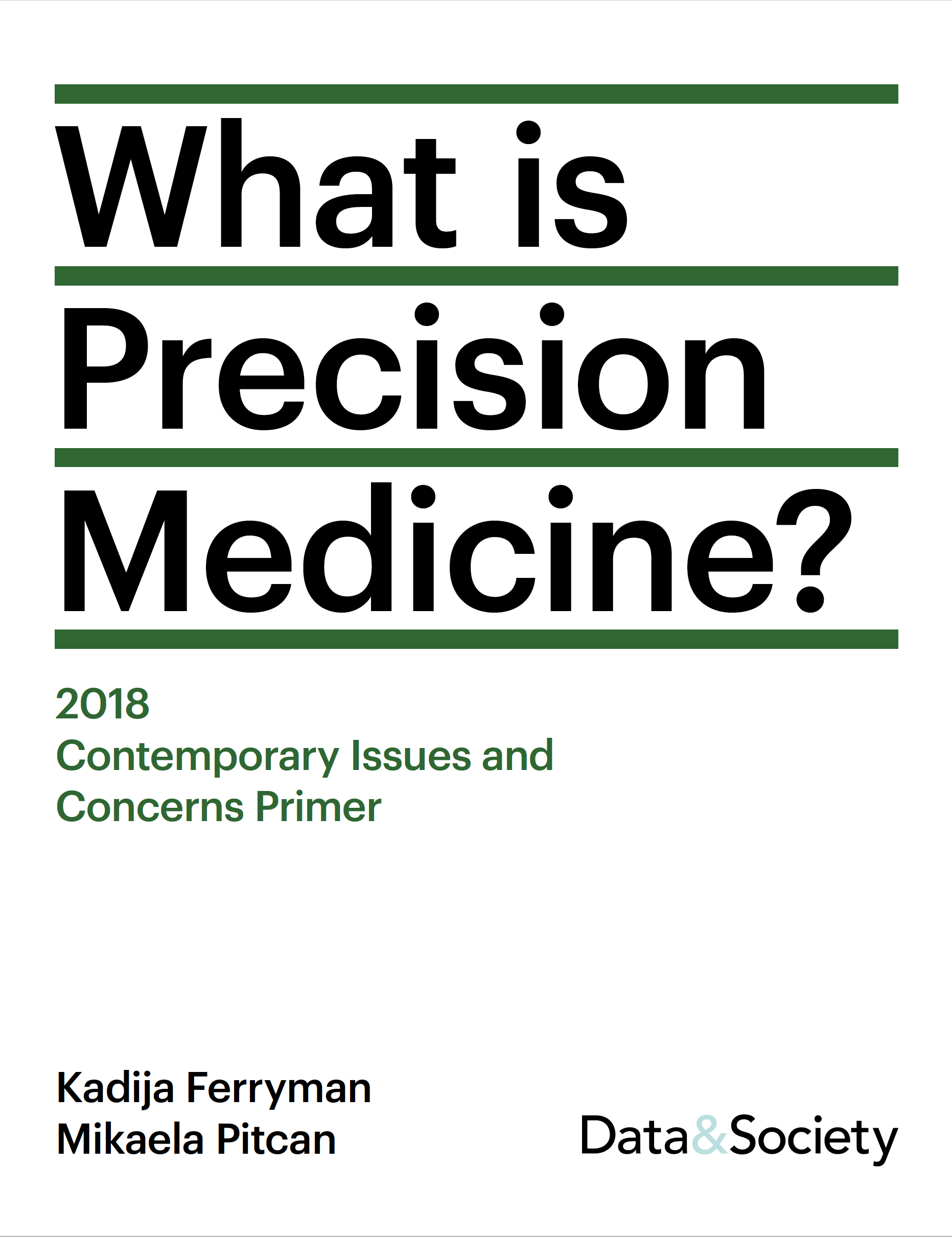
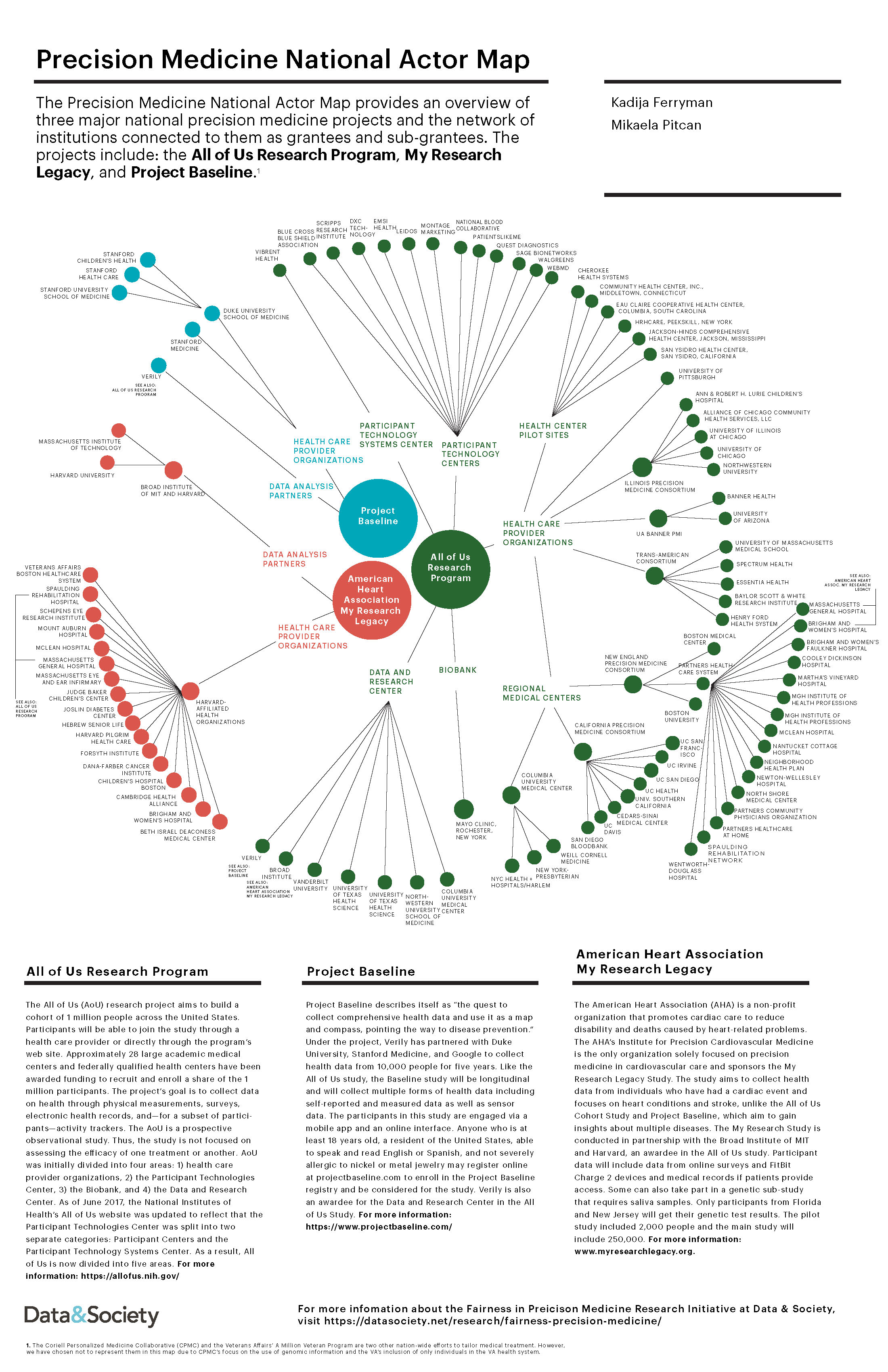
"Excitement for precision medicine must be matched with clear-eyed examinations of the possibility for this emerging field to exacerbate existing risks … or create new points of vulnerability."
Fairness in Precision Medicine
The Intelligence and Autonomy initiative develops grounded, qualitative research to inform the design, evaluation, and regulation of AI-driven systems. This year kicked off the Mapping Human Infrastructures of AI project; a series of ethnographically-informed studies of intelligent systems in which human labor plays an integral part. This project explores how and why the constitutive human elements of artificial intelligence are often obscured or rendered invisible.
Data & Society also hosted the Workshop on Artificial Intelligence and Human Rights, which invited a group of experts from civil society, business, academia, international organizations, and government to engage in dynamic discussions around a central theme: Can the international human rights framework effectively inform, shape, and govern AI research, development, and deployment? A report from this convening was released in fall 2018.
In 2017-2018, Data & Society researchers also explored the effects of technological change on governance frameworks. Recent work examined the disparate impact of big data in policing as well as the ways in which machine learning intersects with current legal and regulatory assessments and demands alternative approaches to designing models against a values-based framework.
Looking ahead into 2019, this initiative will expand its scope to include interconnected areas of work such as the aforementioned human rights area of inquiry and also Fairness, Accountability, and Transparency in Machine Learning.
"The biggest challenge for a hype-driven ecosystem...is the plethora of poorly-constructed models, produced through methodologically unsound practices."
Don’t Call AI “Magic,” Points
In addition to these four research tracks, Data & Society researchers published evidence on a range of critical topics:
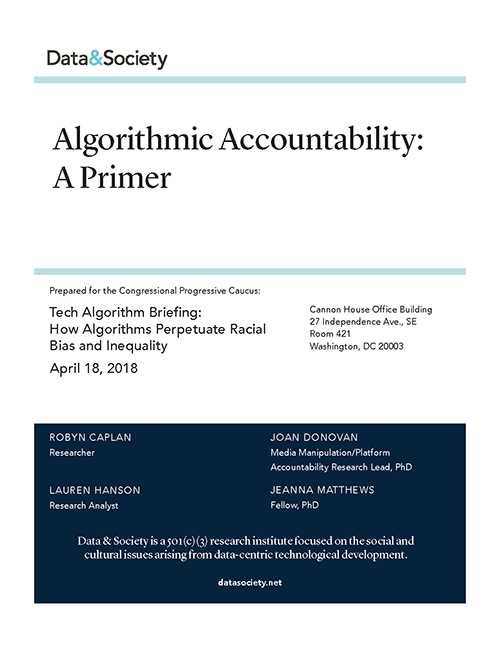

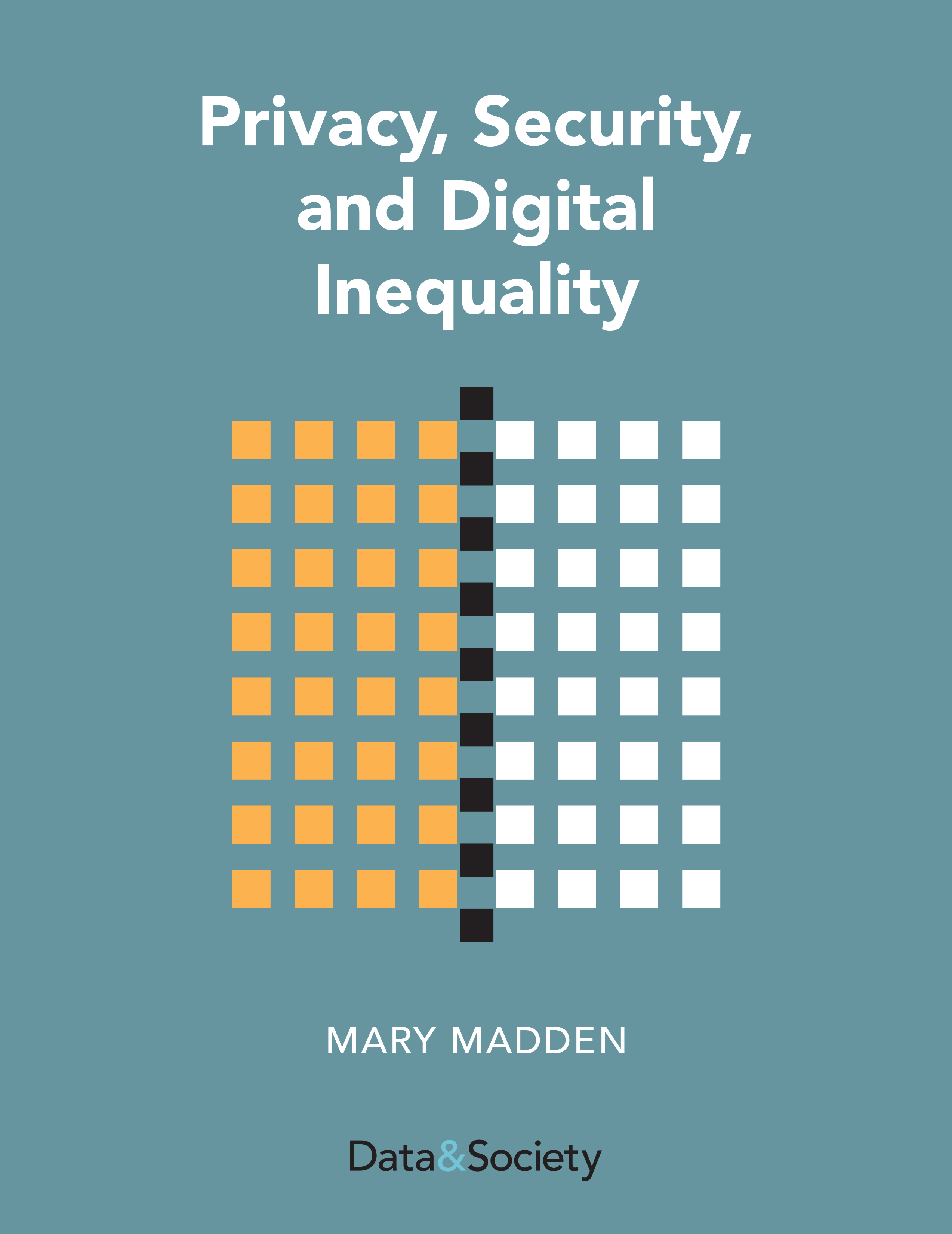
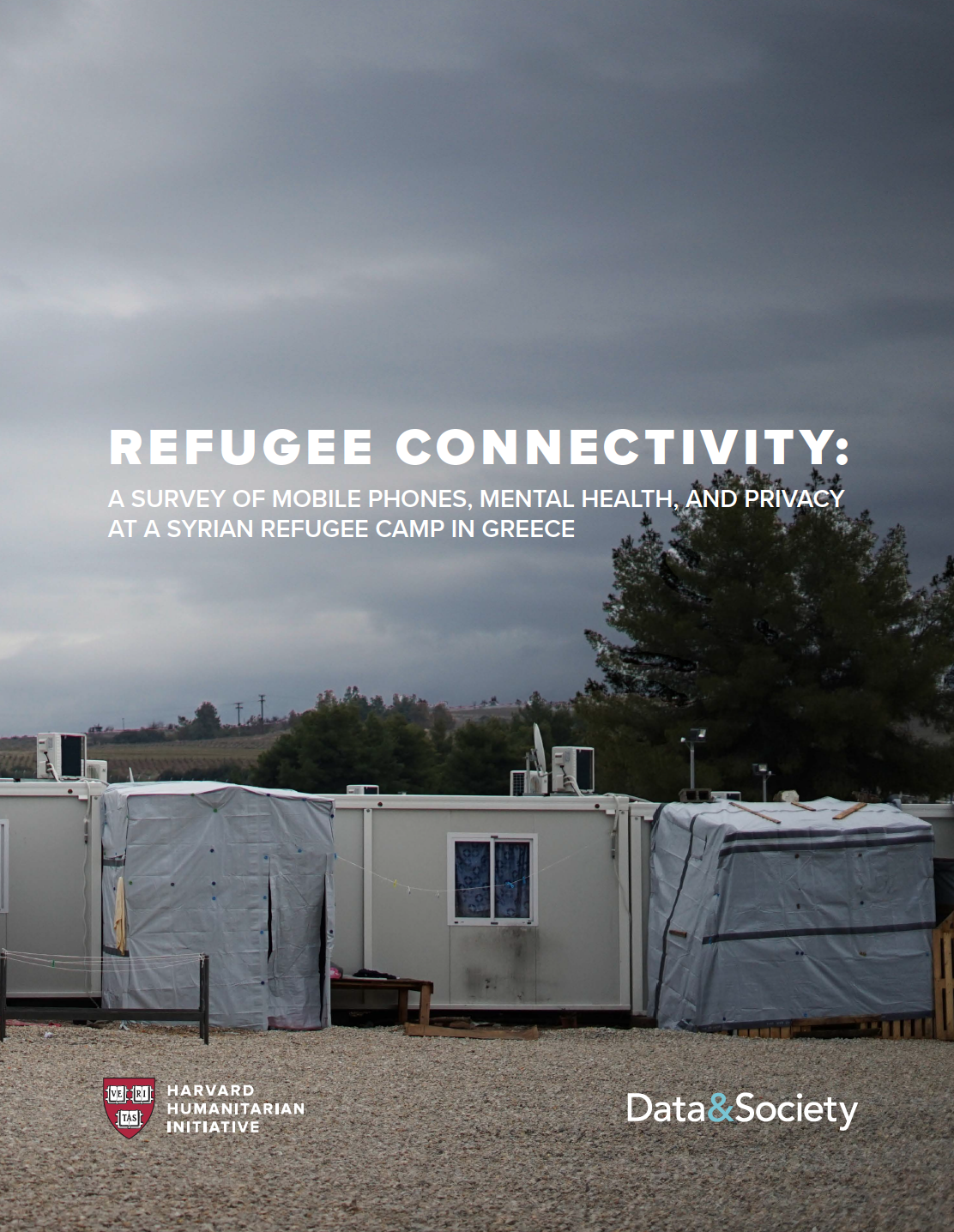
Annual Report 2017–2018
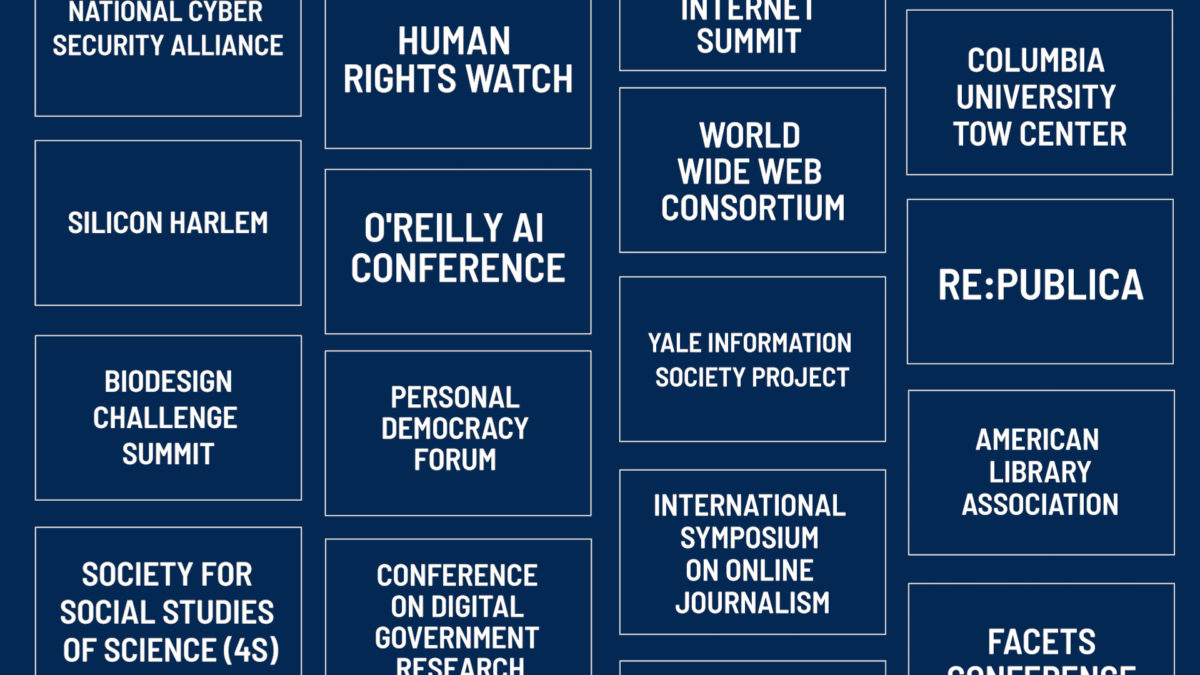
Engagement at Data & Society means building relationships, curating accessible content from evidence-based frameworks, and inviting debate and discussion about the purpose and power of technology in society.
We engage multiple communities and interlocutors through public talks, in-house events, workshops, videos, podcasts, and our annual fellowship program. This year, Data & Society researchers, fellows, and staff presented at venues such as RightsCon, Strata Data Conference, Silicon Harlem, We Robot, and SXSW Edu while our communications and events teams maintained a steady stream of original programming at our New York City headquarters.
Hosting a variety of practitioners and academics–data scientists and engineers, lawyers and librarians, ethnographers and creators, historians and activists–each class of Data & Society fellows connects us more deeply to the field through individual projects, mutual support, contribution to core research projects, and insightful public communications.
We invite you to explore videos (1, 2, 3) of our 2017-18 Fellows Talks, a public showcase of interdisciplinary connections and provocative questions on topics ranging from algorithmic accountability and transparency in criminal justice software, to collectivized digital security practices, to online speech regulation. For a podcast experience, listen to 2017-18 Fellow Matthew Jones discuss “key illiteracies surrounding metadata.”
Data & Society’s “Databites” speaker series presents timely conversations about the purpose and power of technology, bridging our interdisciplinary research with the broader public conversation about the societal implications of data and automation.
From May 2017 through May 2018, we hosted over 850 guests at Databites and in-house events. We continue to invite the public to join us in timely discussions of topics in our field.
When Humans Attack! Conceptualizing Security in the Age of AI
Led by Madeleine Clare Elish, this engagement workshop brought together stakeholders from multiple communities working on issues related to safety and security to discuss the unique vulnerabilities of machine intelligence. Uniting voices from government cybersecurity, industry product design, social science, computer science, and activists and advocates for vulnerable populations, the workshop surfaced tensions and vulnerabilities in planning for safe and secure AI. The workshop enabled discussions and new relationships that rarely occur across sectors, opening new opportunities for collaboration around AI security in the future.
Qualitative Studies of Socio-Technical Systems
Led by danah boyd, this academic workshop asked how we make sense of people’s practices, organizational norms, social values, and cultural logics in a world where technology intersects with society in countless ways. Qualitative methodologies offer a unique approach for understanding what, how, and why. Drawing on different theoretical and disciplinary traditions, this workshop illuminated how the work of ethnographers and other qualitatively-minded scholars can offer a new way of seeing that challenges normative ideas and provides novel frameworks for understanding technology and society.
Artificial Intelligence & Human Rights
Led by Mark Latonero and Melanie Penagos, this stakeholder engagement workshop brought together experts and leaders from civil society, business, academia, international organizations, and government to engage in dynamic discussions around a central theme: Can the international human rights framework effectively inform, shape, and govern AI research, development, and deployment? Topics included the challenges of translation between human rights and technical communities, the nature of human rights in relation to ethics, the potential avenues of engagement by sector, the complexities of legal remedy and redress, and the disproportionate impact of AI on vulnerable populations.
Between Likes and Lies: The Battle Against Media Manipulation
Hosted by News Integrity Initiative at the Craig Newmark Graduate School of Journalism at CUNY, this public engagement event featured an overview of how the Data & Society Media Manipulation Initiative (MMI) studies the social, political, and economic incentives to game information systems, websites, platforms, and search engines. The presenting team also previewed upcoming research reports for an audience of journalists and media makers. Speakers included Joan Donovan, research lead for the Media Manipulation Initiative; danah boyd, founder and president of Data & Society; Francesca Tripodi, Data & Society postdoctoral scholar; and Jeff Jarvis, CUNY’s director of Tow-Knight Center for Entrepreneurial Journalism.
Future Perfect
Curated by Ingrid Burrington, the second-annual Future Perfect gathering at Data & Society brought together individuals from world-building disciplines including art, gaming, fiction, architecture, and science to explore the “uses, abuses, and paradoxes of speculative futures.” Participants used narrative tools and lightning talks to explore automated healthcare, reparations for police violence, nuclear apocalypse, the limitations of financialized futures, and the consequences of SESTA. For full details, including three original commissioned print works, click here.
Data & Society Media Workshop I & II
Curated by Sam Hinds García, these workshops featured brisk and vivid presentations of the latest evidence-based research for media makers seeking empirically-grounded sources and emerging stories at the intersections of society, technology, and culture. Debates explored public “hype cycles” of fear and hope around automated and data-centric technologies. Exercise and reading topics included AI, algorithmic manipulation, bias and equity in health data collection, and emergent instabilities in labor futures.
Small Group Sessions at Data & Society
In order to offer a looser and more flexible model for working practitioners, we also host a variety of small group sessions. This year’s lively sessions had titles like Bots, AI and Labor; Yelp for Health? Assessing Bias in Digital Public Health Data; and Breaking News: How Push Notifications Alter the Fourth Estate.
Annual Report 2017–2018
For Data & Society to achieve our mission, we must continue to build and support a robust field of actors. This starts with dedicated and talented people coming together to build projects with impact. We are incredibly grateful for the unique and compelling contributions of our directors, advisors, researchers, fellows, staff, and affiliates.
- danah boyd
Founder and President of the Board, Data & Society; Principal Researcher, Microsoft Research - Catherine Bracy
Co-Founder and Executive Director, TechEquity Collaborative - Anil Dash
CEO, Glitch - Alexander Macgillivray
Former United States Deputy Chief Technology Officer - Alondra Nelson
Professor of Sociology, Columbia University; President, Social Science Research Council
Annmarie Levins
Jeanna Matthews
Darakhshan Mir
Rishab Nithyanand (Mozilla Open Web Fellow)
Stacy Abder
Rati Godara Bishnoi
Irene Chung
Julian Ehrlich (Temporary/Summer)
CJ Brody Landow
Ronteau Coppin
Audrey Evans
Beth Garrett
Rigoberto Lara Guzmán
Janet Haven
John Borthwick, CEO, Betaworks
Brad Burnham, Managing Partner, Union Square Ventures
Gabriella Coleman, Wolfe Chair in Scientific and Technological Literacy, McGill University
Cathy Davidson, Founding Director, The Futures Initiative; Distinguished Professor, The Graduate Center, City University of New York
Edward W. Felten, Director, Center for Information Technology Policy; Robert E. Kahn Professor of Computer Science and Public Affairs, Princeton University
Tarleton Gillespie, Principal Researcher, Microsoft Research; Affiliated Associate Professor, Dept. of Communication, Dept. of Information Science, Cornell University
Nick Grossman, General Manager for Special Projects, Union Square Ventures
Joichi Ito, Director, MIT Media Lab
Alice E. Marwick, Assistant Professor, Department of Communication, University of North Carolina, Chapel Hill
Hilary Mason, General Manager for Machine Learning at Cloudera; Founder at Fast Forward Labs; Data Scientist in Residence at Accel Partners
Charlton D. McIlwain, Associate professor of Media, Culture & Communication, NYU
Andrew McLaughlin, Founding Executive Director, Tsai Center for Innovative Thinking at Yale; Co-Founder and Partner, Higher Ground Labs; Venture Partner, betaworks
Deirdre Mulligan, Associate Professor, UC Berkeley School of Information
Gina Neff, Senior Research Fellow, Oxford Internet Institute; Associate Professor, Department of Sociology, University of Oxford
Claudia Perlich, Senior Data Scientist, Two Sigma; Advisory Scientist, Dstillery; Adjunct Professor, NYU Stern
Latoya Peterson, Deputy Editor, Digital Innovation, The Undefeated (ESPN)
Andrew Rasiej, Co-founder Personal Democracy Forum and Civic Hall; Chairman, NY Tech Alliance
Joel Reidenberg, Stanley D. and Nikki Waxberg Chair and Professor of Law; Founding Academic Director, Center on Law and Information Policy
Clay Shirky, Associate Arts Professor, Interactive Telecommunications Program; Associate Professor, Arthur L. Carter Institute of Journalism, New York University
Micah Sifry, Co-founder, Civic Hall and Personal Democracy Media
Shamina Singh, Executive Vice President, Sustainability at Mastercard President, Mastercard Center for Inclusive Growth
Baratunde Thurston, Futurist Comedian; Writer; Activist
Janet A. Vertesi, Assistant Professor, Sociology, Princeton University
Christina Xu, Writer, Magpie Kingdom; Faculty, SVA
Ethan Zuckerman, Director, Center for Civic Media, MIT
All lists on this page reference the time period spanning May 2017 to May 2018.
Annual Report 2017–2018
Thanks to our supporters and allies, we can continue to produce original research that grounds informed, evidence-based public debate, while cultivating a unique network of researchers and practitioners ready to anticipate great challenges with vivid insight and direction.
We are deeply thankful for the support we have received during the fiscal year of May 2017 to May 2018 from the following entities:
Craig Newmark Philanthropies
Digital Trust Foundation
Ford Foundation
Institute for Museum and Library Sciences
John D. and Catherine T. MacArthur Foundation
John S. and James L. Knight Foundation
Microsoft
National Information Standards Organization
National Science Foundation
Omidyar Network
Open Society Foundations
Robert Wood Johnson Foundation
Sara & Evan Williams Foundation
Siegel Family Endowment
The Ethics and Governance of AI Initiative
The News Integrity Initiative at the Craig Newmark Graduate School of Journalism at the City University of New York
W.K. Kellogg Foundation
World 50
We are truly grateful for the support Data & Society has received to date to help make our work possible.
Data & Society does not accept funding that would affect our ability to pursue work free of external interference (view our statement of independence here).
If you are interested in supporting our work, we would love to talk with you. Please contact [email protected].





